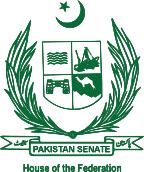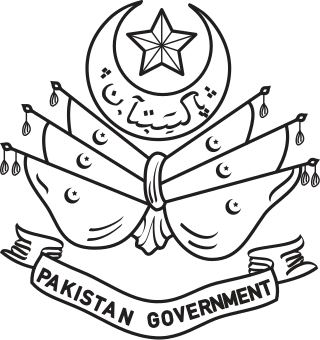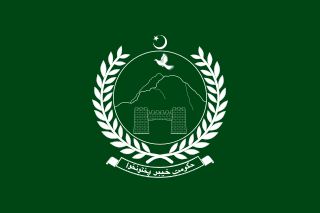Related Research Articles

The Politics of Pakistan takes place within the framework established by the constitution. The country is a federal parliamentary republic in which provincial governments enjoy a high degree of autonomy and residuary powers. Executive power is vested with the national cabinet which is headed by Prime Minister of Pakistan, who works coherently along with the bicameral parliament and the judicature. Stipulations set by the constitution provide a delicate check and balance of sharing powers between executive, legislative, and judicial branches of the government.

A state of emergency is a situation in which a government is empowered to be able to put through policies that it would normally not be permitted to do, for the safety and protection of its citizens. A government can declare such a state during a natural disaster, civil unrest, armed conflict, medical pandemic or epidemic or other biosecurity risk.

The Constitution of Pakistan, also known as the 1973 Constitution, is the supreme law of Pakistan. Drafted by the government of Zulfikar Ali Bhutto, with additional assistance from the country's opposition parties, it was unanimously approved by the 5th Parliament on 10 April and ratified on 14 August 1973. The Constitution is intended to guide Pakistan's law, political culture, and system. It sets out the state's outline, the fundamental rights of the population, the state's law and orders, and also the structure and establishment of the institutions and the armed forces. The first three chapters establish the rules, mandate, and separate powers of the three branches of the government: a bicameral legislature; an executive branch governed by the Prime Minister as chief executive; and an apex federal judiciary headed by Supreme Court. The Constitution designates the President of Pakistan as a ceremonial Head of State who is to represent the unity of the state. The first six articles of the constitution outline the political system as federal parliamentary republic system; as well as Islam as its state religion. The Constitution also encapsulates provisions stipulating the legal system's compliance with Islamic injunctions contained in the Quran and Sunnah.

The President of Pakistan, officially the President of the Islamic Republic of Pakistan, is the ceremonial head of state of Pakistan and the commander-in-chief of the Pakistan Armed Forces.

Fazal Elahi Chaudhry was a Pakistani politician who served as the fifth president of Pakistan from 1973 until 1978, prior to the martial law led by Chief of Army Staff General Zia-ul-Haq. He also served as the deputy speaker of the National Assembly of Pakistan from 1965 to 1969 and the eighth speaker of the National Assembly of Pakistan from 1972 to 1973.

The prime minister of Pakistan is the head of government of the Islamic Republic of Pakistan. Executive authority is vested in the prime minister and his chosen cabinet, despite the president of Pakistan serving as the nominal head of executive. The prime minister is often the leader of the party or the coalition with a majority in the lower house of the Parliament of Pakistan, the National Assembly where he serves as Leader of the House. Prime minister holds office by virtue of their ability to command the confidence of the National Assembly. The prime minister is designated as the "Chief Executive of the Islamic Republic".

The Senate of Pakistan or Aiwān-e-Bālā Pākistān, constitutionally House of the Federation is the upper legislative chamber of the bicameral parliament of Pakistan. As of 2023, It has a total of 100 seats, of which 92 are elected by the provincial legislatures of Pakistan, with equal representation of 23 seats for all provinces, using indirect single transferable votes, while 4 represent the Federal Capital and the remaining 4 are representing FATA, until membership expiration in 2024. Elections are held every three years for one half of the house, each Senator has a term of six years. Unlike the National Assembly, the Senate is a continuing chamber and hence not subject to dissolution.

The National Assembly of Pakistan is the lower legislative house of the bicameral Parliament of Pakistan, which also comprises the Senate of Pakistan. The National Assembly and the Senate both convene at Parliament House in Islamabad, the capital of Pakistan. The National Assembly is a democratically elected body consisting of a total of 336 members who are referred to as Members of the National Assembly (MNAs), of which 266 are directly elected members and 70 reserved seats for women and religious minorities from all over the country. A political party or a coalition must secure 172 seats to obtain and preserve a majority.

The Supreme Court of Pakistan is the apex court in the judicial hierarchy of the Islamic Republic of Pakistan.

The Parliament of Pakistan is the federal and supreme legislative body of Pakistan. It is a bicameral federal legislature that consists of the Senate as the upper house and the National Assembly as the lower house. According to the Constitution of Pakistan, the President of Pakistan is also a component of the Parliament. The National Assembly is elected for a five-year term on the basis of adult franchise and one-man one-vote. The tenure of a Member of the National Assembly is for the duration of the house, or sooner, in case the Member dies or resigns. The tenure of the National Assembly also comes to an end if dissolved on the advice of the Prime Minister or by the president in his discretion under the Constitution.

The Constituent Assembly of Pakistan was established in August 1947 to frame a constitution for Pakistan. It also served as its first interim parliament. It was dissolved by the Governor-General of Pakistan in 1954.

The Constitution of Bangladesh, officially the Constitution of the People's Republic of Bangladesh is the supreme law of Bangladesh. The document provides the framework that demarcates the Bangladeshi republic with a unitary, parliamentary democracy, that enshrines fundamental human rights and freedoms, an independent judiciary, democratic local government and a national bureaucracy.

The Dominion of Pakistan, officially Pakistan, was an independent federal dominion in the Commonwealth of Nations, existing between 14 August 1947 and 23 March 1956, created by the passing of the Indian Independence Act 1947 by the British parliament, which also created an independent Dominion of India.

The Provincial Assembly ofKhyber Pakhtunkhwa is a unicameral legislature of elected representatives of the Pakistani province of Khyber Pakhtunkhwa, which is located in Peshawar, the provincial capital. It was established under Article 106 of the Constitution of Pakistan, having a total of 145 seats, with 115 general seats, 26 seats reserved for women and 4 reserved for non-Muslims. The 11th Provincial Assembly of the Khyber Pakhtunkhwa was dissolved on 18 January 2023, and the province is set to elect a new legislature on 8 October 2023.

The Cabinet of Pakistan is a formal body composed of senior government officials chosen and led by the Prime Minister. All cabinet members sworn in are designated Minister, and are seated at their respective ministries located in the Pakistan Secretariat.
The Constitution of 1956 was the fundamental law of Pakistan from March 1956 until the 1958 Pakistani coup d'état. It was the first constitution adopted by independent Pakistan. There were 234 articles 13 parts and 6 schedules.
The Ministry of Information & BroadcastingWazarat-e- it-tila-aat o nashriyat is a Cabinet-level ministry of Government of Pakistan, responsible to release government information, media galleries, public domain and government unclassified non-scientific data to the public and international communities. The MoIB has jurisdiction for administrating the rules and regulations and laws relating to information, broadcasting and the press media in Pakistan.
Freedom of the press in Pakistan is legally protected by the law of Pakistan as stated in its constitutional amendments, while the sovereignty, national integrity, and moral principles are generally protected by the specified media law, Freedom of Information Ordinance 2002, and Code of Conduct Rules 2010. In Pakistan, the code of conduct and ordinance act comprises a set of rules for publishing, distributing, and circulating news stories and operating media organizations working independently or running in the country.

The Interim Constitution of Azad Jammu and Kashmir provides for an apparently transitory autonomous parliamentary framework of self-governance and power sharing for the region of Azad Jammu and Kashmir, defined by the act as the "territories of the State of Jammu and Kashmir which have been liberated by the people of that State and for the time being under the administration of Government and such other territories as may hereafter come under its administration", however it does not pertain to areas such as Gilgit, Hunza and Baltistan. The act succeeded and re-enacted the Azad Jammu and Kashmir Government Act, 1970 with modifications. It was promulgated under the Prime Minister of Pakistan Zulfiqar Ali Bhutto. The constitution has been amended 14 times. It is based on the 1973 Constitution of Pakistan.
A political and constitutional crisis emerged in Pakistan from, 3 April 2022 to 10 April 2022 when, National Assembly's Deputy Speaker Qasim Khan Suri dismissed a no-confidence motion against Prime Minister Imran Khan during a session in which it was expected to be taken up for a vote, alleging that a foreign country's involvement in the regime change was contradictory to Article 5 of the Constitution of Pakistan. Moments later, Khan stated in a televised address that he had advised President Arif Alvi to dissolve the National Assembly. Alvi complied with Khan's advice under Article 58 of the constitution. This resulted in the Supreme Court of Pakistan (SCP) taking a suo motu notice of the ongoing situation, creating a constitutional crisis, as effectively, Imran Khan led a constitutional coup. Four days later, the SCP ruled that the dismissal of the no-confidence motion, the prorogation of the National Assembly, the advice from Imran Khan to President Arif Alvi to dissolve the National Assembly, and the subsequent dissolution of the National Assembly were unconstitutional, and overturned these actions in a 5-0 vote. The Supreme Court further held that the National Assembly had not been prorogued and had to be reconvened by the speaker immediately and no later than 10:30 a.m. on 9 April 2022.
References
- ↑ "Constitution at 50". DAWN.COM. 10 April 2023.
- ↑ "PID". pid.gov.pk.
- ↑ "PM expresses resolve to strength Constitution making country independent". www.radio.gov.pk.
- ↑ Khurshid, Mian Nairab (20 April 2018). "The Importance Of Celebrating Constitution Day". Courting The Law.
- ↑ Desk, Web (10 April 2023). "April 10 declared as Constitution Day in Pakistan". en.dailypakistan.com.pk.
- ↑ "April 10 declared as National Constitution Day". Geo.tv. 10 April 2023.
- ↑ "PMs Resolution To Celebrate April 10 As National Constitution Day Adopted: Marriyum". UrduPoint.